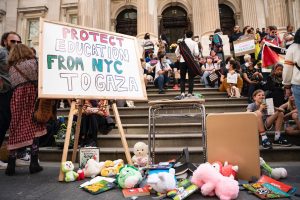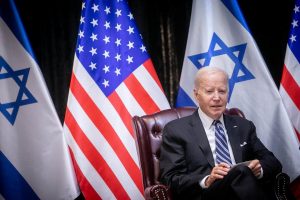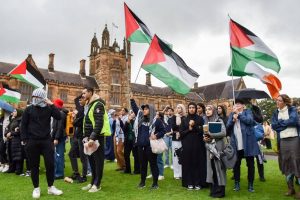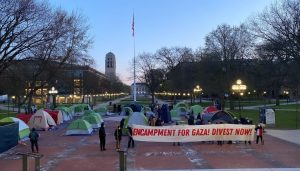Students at the National Autonomous University of Mexico (UNAM) have joined the student movement for Gaza, which has spread internationally with protest encampments set up at universities all over the world. This encampment was launched as the result of an open democratic assembly which holds an important place in the tradition of the Mexican student movement.
Left Voice editor Samuel Karlin spoke with Claudio Escobar, a student at UNAM, precarious worker at the National Anthropological Museum, and member of our sister organization Movimiento de los Trabajadores Socialistas (Socialist Workers Movement). They discussed how UNAM students launched the encampment, the importance of the democratic assemblies for building a massive movement, and how the struggle against repression is connected to the fight against genocide in Palestine and imperialism.
How did students at UNAM decide to launch an encampment in solidarity with Gaza and with the international student movement?
In the last weeks, the Mexican youth and political vanguard of the students were very interested in the encampments that American and French students set up in the universities, like at Columbia University and La Sorbonne. When the repression started in Columbia, CUNY [the City University of New York], UCLA [University of California, Los Angeles], and also in Paris, a group of organizations and activists held a first meeting to discuss how we can act in solidarity with the encampments in the United States and Europe.
We also want to denounce the relationship of the Mexican state with Israel, as well as the relation of the biggest university in Mexico with Zionist groups and Zionist universities. That was a way that we started to think about the encampment.
My organization put forward a proposal to hold an open assembly of the student movement, the workers movement, and the popular movements to try to create a massive encampment at the university. Over 300 people attended this first assembly and discussed the situation in Gaza and in America.
Explain how you’re using the assemblies to decide how to carry forward the movement.
Assemblies are like a natural way of organizing in the Mexican student movement. In the ‘60s and the ‘90s, the student movement held massive assemblies, trying to organize all the sectors that want to fight. Assemblies bring together teachers, students, university workers, workers from other sectors, as well as popular sectors that are part of the university.
When we do the assemblies, we try to vote on people who can moderate the discussion. Someone proposes to do this and we all vote. If this person has the support of the assembly, they start moderating discussions and start to create points of order that we have to discuss. We discuss points like political violence, information about the political situation, relevant things we think that the movement has to discuss. Then we have a point of organization to discuss all the actions that we want to have. This is how we decided to launch an encampment at UNAM.
We try to create the most democratic tradition inside the workers movement: the assembly. The Mexican student movement has recovered this idea that having the widest possible democracy inside the movement is a way to fight against the bureaucracy, against the bourgeois forces inside the movement. So, in this way we can vote and organize independently of the government and the bourgeois parties.
What role have workers played in the struggle? How are you building unity between the students and the workers?
The workers’ union of the university put out a declaration that they will participate in the mobilization this May 15 marking the anniversary of the Nakba. We are trying to create unity between the student movement and the union at the university.
It’s not so easy because the union bureaucracy is against this solidarity between workers and the students. Some sectors are trying to make all decisions for the movement in closed meetings. We are fighting against that, trying to make all decisions in the public assemblies.
What is the relationship like between Mexico’s government and Israel? How does this influence the movement, and what role do the movement bureaucracies and union bureaucracies play?
Mexico has a very functional relationship with the Zionist state.
Israel helped train and fight against the “terrorists” in Mexico in the ‘70s. The “terrorists” refers to the Left. It has been documented that Israel sent airplanes and bombs to the Mexican army to kill the Left militants. In the last period, all the surveillance programs used against leftist movements in Mexico have been provided by Israel.
It’s not easy to force the Mexican government to break these relations because Mexico is very politically dependent on the United States. Also, the Mexican army is so tied to the Israeli army. By fighting the Zionists we are also fighting against the militarization and political persecution of the workers and the student movements in Mexico.
The progressive parties in Mexico want to try to line up the movement behind them. They don’t support massifying the movement. They don’t discuss political ideas and they try to exclude all the independent left political organizations. The bureaucracy fights against self-organization.
The independent, radical leftist groups fight for the most democracy inside the movement and also for the massification of the assemblies and the encampment so we can build a big anti-imperialist, anti-capitalist student movement. We’re trying to build a socialist society with a united workers government.
Why do you see it as important to not just focus on Gaza, but also denounce the repression of the movement in the United States, France, and other imperialist countries?
The fight against repression is also a fight against the government and in the United States and France — fighting against the government is a fight against imperialism. We know that what we are seeing in Gaza is the responsibility of the imperialist governments.
In this way, by fighting against the repression we are fighting for the liberation of Palestine. We cannot separate the fight against repression from the fight against the genocide. There are no separate fights. We have the same fight. The fight of the Mexican students is the fight of the American students, it’s the fight of the French students.
We have to try to stop the bombs in Gaza. We have to try to stop the governments in our countries who repress protest.











